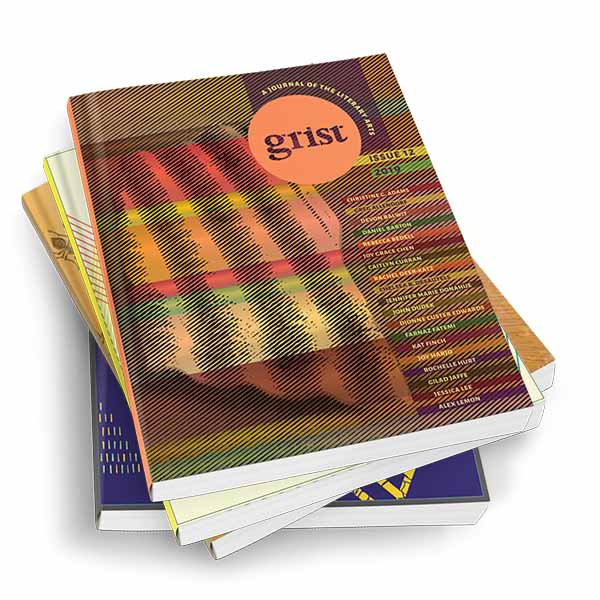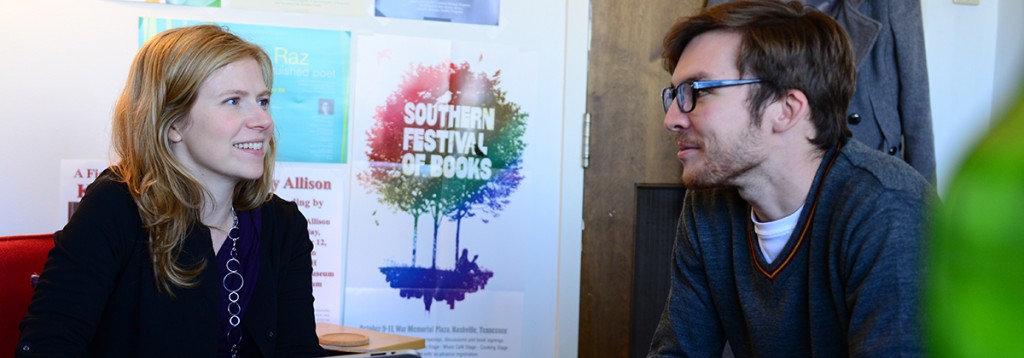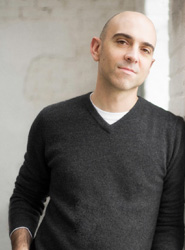DEADLINES
Dec. 1: Round 1 applications / Jan. 15: Round 2 applications

The MFA degree in Creative Writing promotes a combination studio/academic course of study. Degree candidates hone their skills as writers and grow as artists through rigorous application of craft, under the tutelage of our distinguished faculty of Creative Writing and our impressive series of visiting writers. Students receive critical feedback on their poetry, fiction, and creative nonfiction in writing workshops, scrutinize aspects of genre in special topics classes and investigate larger theoretical and historical contexts for creative work in literature, rhetoric, writing, and linguistics courses. They have the opportunity to gain editorial experience by working with Grist: A Journal of the Literary Arts, our journal with a national reputation for publishing strong new work from established and emerging writers. They also have the opportunity to participate in cultural outreach programs such as The Young Writers’ Institute. The MFA program culminates in a creative thesis comprised of a book-length manuscript of original creative work.
Excellent financial support, including generous funds for travel and manuscript submission, help our students gain visibility and publish in prestigious venues. The Graduate Students in English organization, area study groups, and other activities draw students together as an intellectual and social community with shared passions and aspirations.
While the MFA is an essential credential for those students who plan to teach creative writing at any level and those who wish to pursue a PhD in English with a Creative Dissertation, the faculty of the Creative Writing Program at the University of Tennessee believes that study and practice of literary arts is intrinsically valuable, and our program is designed first and foremost for those students who wish to dedicate their lives to writing well. See what some of our alumni have accomplished here.

How to Apply
Note: the GRE is optional. All applications will receive equal consideration, and applications will not be harmed by not including GRE scores.
For consideration in Round 1 (no fee)
- Create a single PDF containing the following:
- creative writing sample of no more than twenty-five pages of fiction or creative nonfiction, or fifteen poems
- a statement of purpose/letter of intent including your name, phone, and email.
- Name the pdf Lastname.firstname.genre (e.g. Morrison.Toni.fiction.pdf).
- Send the PDF to: mfa@utk.edu by December 1.
(Applicants who want to be considered in both genres should send two separate applications).
Notifications for Round 1 will be emailed by January 1. Applicants who are finalists will be invited to submit a full application through the Graduate School, including paying the application fee.
For consideration in Round 2:
A full application (including a $60) is due to the Graduate School by January 15.
This application will also include:
- Online Graduate School Application
- Statement of Purpose
- Transcripts for all colleges and universities previously attended
- Three letters of recommendation
- A critical writing sample of up to twenty pages with works cited
- A creative writing sample of up to twenty-five pages of fiction or creative nonfiction or fifteen poems
- Copies of GRE scores (OPTIONAL)
International students must submit TOEFL scores as required by the Graduate School.
Information
A: Applicants who wish to skip Round 1 may apply directly to Round 2 and pay the $60 application fee.
Q: What is the advantage of applying to Round 1?
A: All applications will receive equal consideration. Submitting an application to Round 1 allows an applicant to learn whether their work would rank among admitted and waitlisted students without the financial outlay and effort of the full application.
All M.F.A. students in Creative Writing must complete:
- A. 24 hours of coursework, to be divided as follows:
- • 12 hours of writing workshops at the 500 or 600 level (some combination of English 580, 581, 582, and 686).
- • 9 hours of graduate courses in literature, rhetoric, writing, or linguistics at the 500 or 600 level.
- • 3 hours of English 505 (Composition Pedagogy).
- B. 6 hours of English 555 (Creative Thesis). The thesis will be directed by a professorial member of the Creative Writing faculty and approved by him or her and two other professors from English. The completed thesis will be defended in an oral presentation. The presentation will consist of a public reading from the work followed by a question-and-answer session in which members of the public (as well as the thesis committee) may take part.
- C. Evidence of proficiency in one foreign language, to be fulfilled in one of the following ways:
- • Completion of a second year of a language at college level with a grade of C or better.
- • Completion of French 302 or German 332 at UT with a grade of B or better.
- • Passing the doctoral foreign language examination as administered at UT.
All applicants to the MFA program must hold a BA or BFA degree by the time they begin their coursework in the fall. While majors in English or Creative Writing are preferred, we also consider students in related disciplines who have completed at least 18 credit hours in upper-level English courses.
The Graduate School requires a 2.7 GPA average in all previous coursework for admission to all master’s programs, but most of our applicants have a much higher GPA.
We evaluate all of our degree candidates holistically, based on a portfolio of grades, recommendations, GRE scores (with an emphasis on the Verbal score), a statement of goals, and two writing samples (one in creative writing and one in critical writing). We are interested in the overall picture of strengths and interests that these materials provide.
We have no specific cutoff numbers for the GRE scores, though our most competitive candidates have Verbal scores of 160 (600 on the old test) or higher.
For information about how to complete your application, click on Admissions.
M.F.A. students have the opportunity to teach both First-Year Composition and a course in Creative Writing. First-year M.F.A. students on teaching assistantships apprentice with a master teacher, assist as tutors in the Writing Center, and study the best practices in writing instruction with our rhetoric and composition faculty. The director of First-Year Composition and the director of the Writing Center provide valuable guidance, insight, and support throughout the teaching experience. In their second year, M.F.A. students are appointed as teaching associates and take full responsibility for their own courses. M.F.A. teaching associates can expect to teach two courses per semester, typically three First-Year Composition courses and one course in Creative Writing.
Our graduate student teachers, as well as our professorial faculty, regularly win departmental, college, and university teaching awards for their superb classroom work. Our assistantships and associateships include a tuition waiver and health insurance. Stipend amounts are competitive, rising to $13,511 during the second year. For more information about our teaching assistantships and associateships, see Fellowships and Assistantships.
- A. 24 hours of coursework, to be divided as follows:
- • 12 hours of writing workshops at the 500 or 600 level (some combination of English 580, 581, 582, and 686) in the genre in which the student was admitted.
- • 9 additional hours of graduate courses in literature, rhetoric, writing, or linguistics. Three of these hours may be taken in a 500 or 600 level creative writing workshop outside the student’s core genre or in a 400, 500 or 600 level class in a collateral area outside the English Department. Classes in collateral areas should be selected in consultation with the DGS and the student’s advisor.
- • 3 hours of English 505 (Composition Pedagogy).
- B. 6 hours of English 555 (Creative Thesis). The thesis will be directed by a professorial member of the Creative Writing faculty and approved by him or her and two other professors from English. The completed thesis will be defended in an oral presentation. The presentation will consist of a public reading from the work followed by a question-and-answer session in which members of the public (as well as the thesis committee) may take part.
- C. Evidence of proficiency in one foreign language, to be fulfilled in one of the following ways:
- • Completion of a second year of a language at college level with a grade of C or better.
- • Completion of French 302 or German 332 at UT with a grade of B or better.
- • Passing the doctoral foreign language examination as administered at UT.

